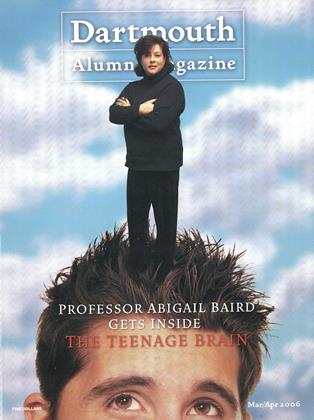QUOTE/UNOUOTE "Osama bin Leiden's got out more videos than Mary-J.Blige. The video man can find him, the dialysis man can find him, but George Bush and the CIA can t find him." REV. ALSHARPTON,SPEAKING ON CAMPUS JANUARY 12
IF HEADLINES COULD MAKE NOISE, the one from The Dartmouth on February 10, 1999, would practically scream. "Trustees to End Greek System 'As We Know It,' " the front page proclaimed, across five columns, in huge bold type.
Almost immediately students responded in kind. A thousand people, with almost anti-war intensity, marched on President James Wrights house. Fraternities canceled Winter Carnival parties in protest while others became soapboxes for angry speeches. Within days campus editorials called the decision "disgusting," "a political ploy" and even "a sick joke," and the national press came to Hanover to see what all the fuss was about.
It was about the Student Life Initiative (SLI): a sweeping effort to fundamentally change how students spend time when they aren't in class—including, most controversially, time spent drinking beer in basements.
Five years after SLI launched with a bang, however, it appears to have ended with something akin to a sigh. In November, with litde fanfare, Dean of the College Jim Larimore told two alumni groups that because SLI had successfully met most of its goals, it was no longer a focus. "Greek life did change, but in good ways," Larimore said. "We have moved the system in a very positive direction."
Initially, those changes meant most dramatically removing taps and keg-erators from basements. SLI also required that every fraternity and sorority be brought up to code in terms of plumbing and electrical systems, fire exits and access for the handicapped. The College made low-interest loans available to the Greek houses to pay for such improvements.
SLI also created a new judicial system, the Organizational Adjudication Committee, for dealing with infractions such as underage drinking, and called for the houses to strengthen relations with national chapters as well as to compete in national awards programs that recognize service and academics. Plus, the College assigned more administrators to individual houses, to better solicit student opinions.
"The perception was that somehow we were going to take the fun out of Dartmouth," says Marcia Kelly, associate dean of the College. "But students have really taken these changes to heart."
They've also fought others. Student outcry against SLI, say some Greek leaders, forced the administration to end its moratorium on the creation of new houses. Sustained pressure on the deans also led to moving rush back from sophomore winter, where SLI had tried to relocate it, to sophomore fall, they say.
Yet, SLI didn't dismantle the singlesex Greek system as many feared. If anything, interest in the system seems stronger than ever. In 2000, before the SLI kicked in, there were 1,697 members of fraternity, sorority or coed organizations. By the end of 2005, in comparison, there were 1,785 members, about 60 percent of the student body. And 2006 is on track to best those totals. The numbers of bids "sunk" in October was on average higher than the rush numbers for 2004.
Perhaps the SLl's greatest accomp lishment was reversing the us-vs.-them AnimalHouse dynamic. Some fraternity officers speak of the same administrators who tried to "end the Greek system as we know it' " in respectful, even flattering terms.
"It was pretty unrealistic to expect that a unilateral move would transform the social culture," says Brendan Neff'07, formerly on the Greek Leadership Council and now the new house manager of Phi Delta Alpha. "But we ended up with sensible limitations on social events."
Although Neff admits some alums continue to grumble about how things have changed, they're the exceptions. As for students, there is general equanimity if there's awareness of SLI as an issue at all. "Most of the angry people," he says, "have graduated."
Frat Row
 View Full Issue
View Full Issue
More From This Issue
-
 Feature
Feature“D” is for Denial
March | April 2006 By PETER JAQUITH ’58 -
 Cover Story
Cover StoryMind Matters
March | April 2006 By Irene M. Wielawski -
 Feature
FeatureNotebook
March | April 2006 By THOMAS AMES JR. '74 -
 Feature
FeatureAlumni News
March | April 2006 By Paul Stone '60 -
 PERSONAL HISTORY
PERSONAL HISTORYThe Stages of Life
March | April 2006 By Nell Shanahan ’99 -
 Sports
SportsThree Times a Coach
March | April 2006 By Brad Parks ’96
C.J. Hughes ’92
-
 Article
ArticleHALLS OF NAME
Sept/Oct 2007 By C.J. Hughes ’92 -
 Feature
FeatureFantastic Four
Sept/Oct 2007 By C.J. Hughes ’92 -
 Feature
FeatureWho Is Phil Hanlon ’77?
July/Aug 2013 By C.J. Hughes ’92 -
 COVER
COVERTrail Blazer
JANUARY | FEBRUARY 2020 By C.J. Hughes ’92 -
 Voices in the Wilderness
Voices in the WildernessLexi Krupp '15
NOVEMBER | DECEMBER 2021 By C.J. Hughes ’92 -
 PURSUITS
PURSUITSFlight Control
JULY | AUGUST 2022 By C.J. Hughes ’92







